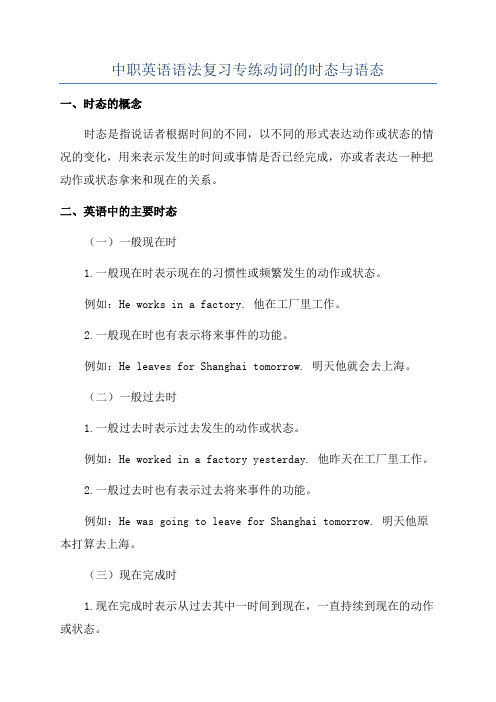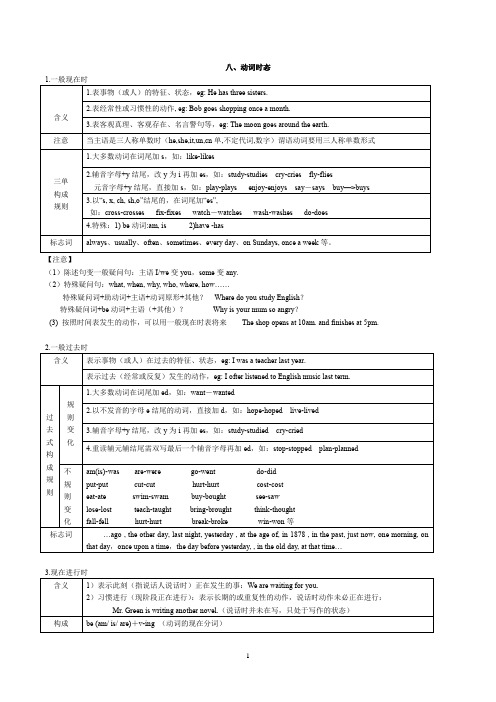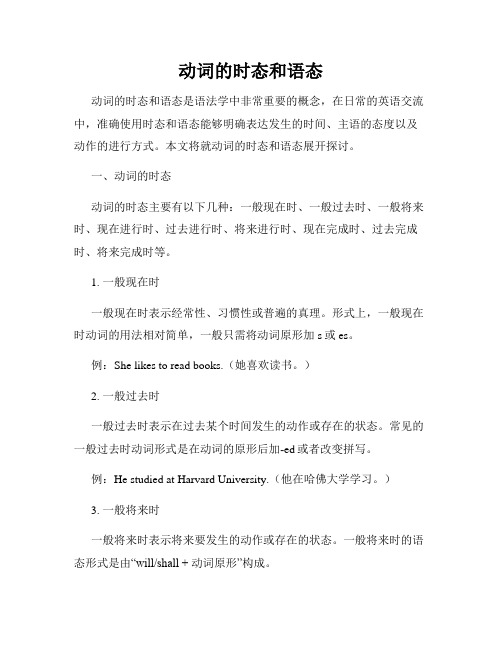语法复习:动词时态和语态
高中语法动词的时态和语态

一、一般现在时1、表示经常发生的习惯性的、现在反复出现的动作或状态,常用的时间状语有:always,usually,seldom, sometimes, every day, now and then, once a week等。
2、表示眼下或目前等现在时间所发生的动作或存在的状态,这种状态带有一定的持续性。
3、表示客观事实或普遍真理。
4、书报的标题,故事的叙述,小说、戏剧、电影等情节介绍,图片的说明等。
5、时间表、时刻表、日程表、节目单、课程表等按规定将要发生的动作,只限于go, arrive, leave, start, stay, return, begin, come等动词。
6、在时间、条件、方式、让步状语从句中,表示将来的动作。
注意:一般现在时可以用于定语从句或宾语从句中表示将来。
7、用在某些表达中,表示现在正在发生的动作或存在的状态。
Here comes the bus!How it rains!二、一般过去时1、表示在过去某一时间点发生的动作或所处的状态,与现在没有关系。
常用的时间状语有:yesterday, last night, at that time等。
2、表示在过去某一段时间里反复出现的动作或状态,与现在没有关系。
3、用used to do或would do表示过去经常或反复发生的动作。
4、有些情况发生的时间没清楚表明,但实际上是“刚才,刚刚”发生的,属于过去时间,应使用过去时态。
常见的有I didn’t know…或I forgot…等。
5、一般过去时可与today, this week, this month等时间状语连用。
三、一般将来时1、will/shall do(1)表示将来会出现的动作或状态。
常用的时间状语:this evening, tomorrow, next week/month…,at the end of this term, in a few minutes等。
语法复习-谓语动词的时态+语态(共83张PPT)

现在 过去 将来
一般
进行时
完成时
一般现在时: 现在进行时:
原形(do)
am/is/are doing
第三人称单数形
式(does)
现在完成时: have / has done
一般过去时:
一般过去式 (did)
过去进行时: 过去完成时: was / were doing had done
一般将来时:
1)will do
drop, fit, nod, dig, forget, regret, rid】 • 4)以 y 结尾的动词,直接加 ing • 5)以ie结尾的动词,把ie改为y ,再加ing
动词的ing形式
• run_____ • swim____ • sit ____
• stop_____ • have_____ • dance_____ • organize____
②③不适合语法填空中填 动词的适当形式。
一般将来时的用法
1. He will graduate from Harvard University next year.
2. I am going to buy a new laptop this winter. 3. The car is going to turn over. 5. I am to take over the job. 6. The conference is about to begin.
过去 将来
现在
将来
现在 过去 将来
一般
进行时
完成时
一般现在时: 现在进行时:
原形(do)
am/is/are doing
第三人称单数形
式(does)
中职英语语法复习专练动词的时态与语态

中职英语语法复习专练动词的时态与语态一、时态的概念时态是指说话者根据时间的不同,以不同的形式表达动作或状态的情况的变化,用来表示发生的时间或事情是否已经完成,亦或者表达一种把动作或状态拿来和现在的关系。
二、英语中的主要时态(一)一般现在时1.一般现在时表示现在的习惯性或频繁发生的动作或状态。
例如:He works in a factory. 他在工厂里工作。
2.一般现在时也有表示将来事件的功能。
例如:He leaves for Shanghai tomorrow. 明天他就会去上海。
(二)一般过去时1.一般过去时表示过去发生的动作或状态。
例如:He worked in a factory yesterday. 他昨天在工厂里工作。
2.一般过去时也有表示过去将来事件的功能。
例如:He was going to leave for Shanghai tomorrow. 明天他原本打算去上海。
(三)现在完成时1.现在完成时表示从过去其中一时间到现在,一直持续到现在的动作或状态。
例如:He has worked in a factory for 10 years. 他在工厂已工作 10 年。
2.现在完成时也有表示过去将来事件的功能。
例如:He had planned to leave for Shanghai tomorrow. 他原本计划明天去上海。
(四)现在进行时1.现在进行时表示正在发生的动作或状态。
例如:He is working in a factory. 他正在工厂里工作。
2.现在进行时也有表示将来时间发生的动作或状态的功能。
例如:He is going to leave for Shanghai tomorrow. 明天他将去上海。
(五)过去进行时1.过去进行时表示过去正在发生的动作或状态。
初中英语语法专项8动词的时态和语态

【中考考点】
(1)动词的第三人称单数形式、过去式、过去分词和现在分词的构成。 (2)动词的八种时态的基本结构及用法。 (3)动词的被动语态的基本结构及用法。 (4)动词的主动形式表示被动意义的用法。
动词的时态
考点一 一般现在时
1.结构 一般现在时主要用动词原形表示(当主语是第三人称单数时,谓语动词用第三人称单数形式)。 2.动词的第三人称单数形式变化规则 (1)直接加-s。如:work—works (2)以“辅音字母+y”结尾的词,先变y为i,再加-es。如:carry—carries, cry—cries, try—tries, study—studies (3)以s, x, o, ch, sh结尾的词加-es。如: pass—passes, fix—fixes, go—goes, do—does, teach—teaches, wash—washes (4)特殊:have—has, are—is
动词的时态
考点四 过去将来时
1.结构 would+动词原形 was/were+going to+动词原形 2.用法 表示从过去的某一时刻看,将要发生的动作。 His uncle said that there would be a good harvest the next year.他叔叔说第二年会有一个 好收成。 【注意】 在由if引导的条件状语从句中,如果主句用过去将来时,那么if从句需用一般过去时代替过 去将来时。 If he were here, he would show us how to do it. 如果他在这儿,他就会向我们展示该如何做。
动词的时态
4.动词过去式的变化规则 (1)一般情况下,在动词原形后加-ed。如: watch—watched (2)以不发音的字母e结尾的加-d。如:live—lived (3)以“辅音字母+y”结尾的,变y为i,再加-ed。如: study—studied, carry—carried, cry—cried (4)以重读闭音节结尾,且末尾只有一个辅音字母的,先双写该辅音字母,再加-ed。如: stop—stopped, plan—planned, prefer—preferred (5)不规则动词的过去式需特殊记忆。
(完整版)高中语法之常用时态语态详解

第四章时态和语态一.动词的时态英语时态用共有十六种时态,其中常用的有8种,它们是:一般现在时、一般过去时、一般将来时、现在进行时、现在完成时、过去进行时、过去完成时和过去将来时。
一. 一般现在时.1.构成. be动词:am is are ; 其他动词用动词原形,当主语是第三人称单数时要在谓语动词后加“s”,其变化规则与名词变复数一致。
2.用法. 1). 经常性或习惯性的动作,常与表示频度的时间状语连用。
如usually, always, often, seldom, never, every...,eg. I leave home for school at 7 every morning.I don’t leave home for school at 7 every morning.Do I leave home for school at 7 every morning?He usually gets up early.He doesn’t usually get up early.Does he usually get up early?2) 客观真理,客观存在,科学事实。
eg. The earth moves around the sun.The earth doesn’t move around the sun 否定句Does the earth move around the sun? 疑问句Shanghai lies in the east of China.Shanghai doesn’t lie in the east of China 否定句Does Shanghai lie in the east of China? 疑问句Water boils at 100 centigrade degrees.3) 表示格言或警句中eg. Pride goes before a fall.注意. 此用法如果出现在宾语从句中,即使主句是过去时,从句谓语也要用一般现在时。
2023年英语中考语法总复习—8.动词时态和语态

八、动词时态【注意】(1)陈述句变一般疑问句:主语I/we变you,some变any.(2)特殊疑问句:what, when, why, who, where, how……特殊疑问词+助动词+主语+动词原形+其他?Where do you study English?特殊疑问词+be动词+主语(+其他)?Why is your mum so angry?(3) 按照时间表发生的动作,可以用一般现在时表将来The shop opens at 10am. and finishes at 5pm.【注意】(1)always也可用于现在进行时,表示一种强烈的感情色彩,译为“总是”He is always telling lies.(2)某些特殊动词不能用于现在进行时。
① have当“有”讲时,不能用现在进行时。
I have two books now.②“belong to” The two people belong to me now.③表示“心理活动/状态/感觉”的词I want a dog now.① be going to主要用于:主观判断(1)表示事先经过考虑、安排好打算要做的事情:I’m going to play the violin.(2)表示根据目前某种迹象判断,某事非常有可能发生(有迹象表明要发生的事)。
Look!There come the dark clouds. It is going to rain.② will主要用于:(1)客观上将来势必发生的事情, 未经事先考虑, 临时决定的They will go to visit the factory tomorrow.(2)表示不以人的意志为转移的自然发展的未来的事:Today is Saturday. Tomorrow will be Sunday.(3)表意愿。
问对方是否愿意做某事或表示客气地邀请或命令:Will you please turn on the radio?(1) have/has been to “去过已回”She has been to Japan twice.have/has gone to. “去了未回”Where is your twin sister? She has gone to Japan.have/has been in “待在某地” She has been in Japan for 2 years. (2) 动词从词义上可以分为延续性和非延续性两种。
动词的时态和语态

动词的时态和语态动词的时态和语态是语法学中非常重要的概念,在日常的英语交流中,准确使用时态和语态能够明确表达发生的时间、主语的态度以及动作的进行方式。
本文将就动词的时态和语态展开探讨。
一、动词的时态动词的时态主要有以下几种:一般现在时、一般过去时、一般将来时、现在进行时、过去进行时、将来进行时、现在完成时、过去完成时、将来完成时等。
1. 一般现在时一般现在时表示经常性、习惯性或普遍的真理。
形式上,一般现在时动词的用法相对简单,一般只需将动词原形加s或es。
例:She likes to read books.(她喜欢读书。
)2. 一般过去时一般过去时表示在过去某个时间发生的动作或存在的状态。
常见的一般过去时动词形式是在动词的原形后加-ed或者改变拼写。
例:He studied at Harvard University.(他在哈佛大学学习。
)3. 一般将来时一般将来时表示将来要发生的动作或存在的状态。
一般将来时的语态形式是由“will/shall + 动词原形”构成。
例:I will go to the park tomorrow.(明天我将去公园。
)4. 现在进行时现在进行时表示正在进行的动作。
现在进行时的时态形式是由“be 动词(am/is/are)+动词-ing形式”构成。
例:They are playing basketball now.(他们现在正在打篮球。
)5. 过去进行时过去进行时表示过去某个时间正在进行的动作。
过去进行时的时态形式是由“was/were + 动词-ing形式”构成。
例:He was studying at the library yesterday.(昨天他在图书馆学习。
)6. 将来进行时将来进行时表示将来某个时间正在进行的动作。
将来进行时的时态形式是由“will be + 动词-ing形式”构成。
例:They will be traveling to Europe next month.(他们下个月将要去欧洲旅行。
语法解析动词时态和语态

语法解析动词时态和语态动词是语法中一个非常重要的词类,它在句子中负责表达动作、状态、事件的发生或存在。
动词的时态和语态是我们在学习和使用动词时需要重点关注的两个方面。
本文将对动词的时态和语态进行详细的解析和讨论。
一、动词的时态动词的时态指的是动作发生的时间,主要分为一般现在时、一般过去时、一般将来时等几种。
1. 一般现在时(Simple Present Tense)一般现在时表示经常性或习惯性的动作、客观真理、科学事实等。
例如:- He reads books every day.(他每天都读书。
)- Water boils at 100 degrees Celsius.(水在100摄氏度时煮沸。
)2. 一般过去时(Simple Past Tense)一般过去时表示过去某个时间发生的动作或存在的状态。
例如:- They went to the park yesterday.(他们昨天去了公园。
)- Mary studied English when she was in college.(玛丽上大学时学习了英语。
)3. 一般将来时(Simple Future Tense)一般将来时表示将来某个时间将要发生的动作或存在的状态。
例如:- I will travel to Beijing next month.(我下个月将去北京旅行。
)- They are going to have a party tonight.(他们今晚将举办一个派对。
)除了上述的三种基本时态,动词还有一些其他的时态形式,如现在进行时、过去进行时、将来进行时、现在完成时、过去完成时、将来完成时等。
这些时态形式在表达不同的情况和语境时使用,可以增强句子的准确度和表达力。
二、动词的语态动词的语态指的是动作的主体和所受到的影响,主要分为主动语态和被动语态两种。
1. 主动语态(Active Voice)主动语态表示主体执行动作或发生状态。
- 1、下载文档前请自行甄别文档内容的完整性,平台不提供额外的编辑、内容补充、找答案等附加服务。
- 2、"仅部分预览"的文档,不可在线预览部分如存在完整性等问题,可反馈申请退款(可完整预览的文档不适用该条件!)。
- 3、如文档侵犯您的权益,请联系客服反馈,我们会尽快为您处理(人工客服工作时间:9:00-18:30)。
语法复习:动词时态一、动词的分类和形式:动词是表示动作和状态的词。
动词有时态、语态和语气3种形式的变化。
1、动词按其能否独立作谓语而分为:“谓语动词”和“非谓语动词”两种2、动词的4种基本形式:动词原形、过去式、过去分词和现在分词。
3、动词按其构成动词词组作用分为:实义动词、连系动词、情态动词和助动词。
二、动词的时态:一)、一般现在时的用法:1)表示现在的习惯,经常发生的动作或存在的状态。
He gets up early everyday.2)表示主语的特征、性格和能力He is a kind-hearted man and willing to help others.3)表示客观事实或真理。
When I was a little child, my father told me that the earth is round.4)表示按照时刻表,计划安排好的将来行为。
(只限于是go, come, leave, start, stop, be等表示移动意义的词。
)The plane takes off/ leaves at 7.am.二)、一般过去时的用法:1)表示过去的动作或状态。
(一般含有具体的过去时间) He was born in 1990.2)表示过去一段时间内经常发生的动作。
He worked in Beijing for a month and now he is working in Nantong.三)、一般将来时的用法:表示将来的动作或状态。
I will inform him of the news when I meet him.四)、现在进行时的用法:1)表示说话时正在进行的动作。
Your car is being repaired now.2)表示现阶段正在进行的动作。
(说话时动作不一定进行)She is working in a factory.(=works) 五)、过去进行进的用法:1)过去某一时刻或某一段时间内正在进行的动作。
Last night when you called me, I was watching TV.The child was being examined by the doctor when they came in.2)表示移动的动词:come, start, stay, leave, go等词的过去进行时可以表示过去的将来要发生的动作。
He said he was going to Shanghai soon.六)、现在完成时的用法:1)表示刚刚完成的动作,常与just连用。
I have just heard of it.2)表示过去发生而持续到现在的动作或状态,甚至延续到将来。
常与since, for连。
I haven’t seen him since he went abroad. He has lived here for 5 years./ since 5 years ago.3)表示过去的动作对现在造成的影响或结果。
Have you met each other before? The work hasn’t been finished yet.现在完成进行时have been doing 表示动作从过去开始一直进行到现在并很可能持续下去。
Mary has been reading the novel and she hasn’t finished it yet.I haven’t been sleeping well since I returned home.常和the whole morning/ afternoon/ day, all day long 等时间搭配。
--- Why are you so tired? --- I have been painting the wall the whole morning.七)、现在完成时与一般过去时的区别:1)现在完成时与现在有联系,它表示过去的动作对现在所产生的结果、影响。
一般过去时通常表示在过去某一具体时间发生的动作,与现在没什么联系。
2)现在完成时表示过去延续到现在的行为;一般过去时着重过去某一时刻的某一具体动作。
Have you finished your work? Did you finish your work?八)、过去完成had done的用法:表示在过去某一或动作之前已经完成的动作,”过去的过去”。
常用by, before或上下文暗示。
The train had left when/ before I arrived there.九)、过去将来时的用法:表示对于过去某一时刻而言将要发生的动作或存在的状态。
8. They can't leave until they _____ their work.A. didB. are doingC. have doneD. has done9. "Has he seen this film?" " Yes. He ______ it several days ago. "A. sawB. has seenC. had seenD. was seeing10. Now Mike isn't here. He ______ Mr Green's. Perhaps he ______ back in a few minutes.A. went to; is comingB. has gone to; will comeC. has been to; will beD. is going to; has come11. That day he ._______ his clothes before he came to see me.A. has washedB. washedC. had been washingD. was washed12. I haven't finished my composition. I ______ for two hours and a half.A. have written itB. have been writing itC. wrote itD. am writting it13. I will take my daughter with me when I _____ ShangHai,A. go toB. will go toC. have been toD. have gone to14. This bright girl ______ the truth in front of the enemy.A. didn't sayB. couldn't speak toC. saidD. didn't tell15. The bridge which ______ last year looks really beautiful.A. was builtB. builtC. was set upD. had been built16. " When ______ school begin?" " Next Monday. "A. hasB. doesC. didD. is going to17. I will ______ here till you give me some money.A. leaveB. not leaveC. comeD. return18. I _____ here since I moved here.A. will workB. workedC. workD. have been working19. Every time I _____ there, I will buy him something nice.A. wentB. will goC. goD. have gone20. It was said that his father ______.A. has diedB. died.C. has been deadD. had died21. We won't go unless you ______ soon.A. had comeB. cameC. will comeD. come22._____six years since I began studying English.A. They have beenB. it isC. It wasD. There are23. They ______ the Summer Palace three times.A. have gone toB. have been toC. have been inD. have gone into24. "How long haven't we seen each other? ""Well, it _____ nearly two years since we ______ last. "A. is/have metB. was/had metC. is/metD. has been/had met25. "Have you seen the art exhibition?" "No, _____ there. "A. it was not being heldB. they didn't holdC. it had not heldD. they were holding it26. Don't get off the bus until it ______.A. stopB. will stopC. stoppedD. has stopped27. "Where ______ the recorder? I can't see it anywhere." "I _____ it right here. But now it's gone. "A. did you put/have putB. have you put/putC. had you put/was puttingD. were you putting/have put28. They asked me to have a drink with them. I said that it was 10 years since I ______ a good drink.A. had enjoyedB. was enjoyingC. enjoyedD. had been enjoying29. Don't come tonight. I would rather you _____ tomorrow.A. comeB. cameC. will comeD. coming30. ______ you ______?A. Do/marryB. Have/marriedC. Have/been marriedD. Are/married31. When he ______ all the newspapers, he'll go home.A. sellsB. has soldC. will have soldD. will be sold32. "This cloth _____well and _____ long. ""Ok. I'll take it. "A. washes/lastsB. is washed/lastedC. washes/is lastedD. is washing/lasting33. "Hurry up, you ______ on the phone. " "Oh, I'm coming. Thank you. "A. are wantedB. are being wantedC. wantD. are wanting34. I ______ see you, but I didn't, for I had no time.A. had wanted toB. has wanted toC. wantedD. was wanted35. I ______ in Guang Zhou for six years by this October.A. have livedB. was livingC. will be livingD. shall have lived36. By this time next year he ______ from the college.A. will be graduatingB. should be graduating .C.will have graduatedD. is graduating37. Our teacher told us that the earth _____ from west to east.A. turnsB. turnC. has turnedD. had turned38. My brother _____ while he _____ his bicycle and hurt himself.A. fell/was ridingB. fell/were ridingC. had fallen/rodeD. had fallen/was riding39. Bill said he ____ twenty-one the next year.A. was going to beB. was about to beC. could beD. was to be40. It is high time you _____ in bed now.A. areB. wereC. will beD. would be41. After a while an agreement _____.A. was arrived atB. was arrived inC. was arrivedD. has been arrived42. The air liner from Beijing _____ at 3:00 p.m.A. is about to arriveB. has arrivedC. arrivesD. is going to arrive43.______,that step is not safe! A . Look around B. Look up C. Look out D. Look down44. "Have you _____ him to give up smoking?" "No. I _____, but he wouldn't listen."A. persuaded/triedB. tried/persuadedC. tried/triedD. persuaded/persuaded45. The research laboratory is going to ______ the new type of computer to use.A. takeB. makeC. putD. send46. I don't know when he ______, but when he ______, I'll let you know.A. will come/comesB. comes/will comeC. comes/comesD. will come/will come47. How much do you think that vase ______? Ais cost B. used C. was paid for D. cost48. I _____ that he would be able to leave tomorrow, but it's beginning to look diffcult.A. hopeB. had hopedC. hopedD. am hoping49. “Come on, Peter, I want to show you something.”“Oh, how nice of you, I _____ you _____ to bring me a gift.”A. never think/are goingB. never thought/ were goingC. didn’t think/ are goingD. hadn’t thought/ were going50. It’s a nice flat, bu t it _____ a proper bathroom.A. haven’t gotB. hasn’t gotC. wouldn’t getD. doesn’t have got51. She had a shock when she heard the news, _____?A. hadn’t sheB. didn’t sheC. wouldn’t sheD. won’t she52. This liquid _____ the salt at room temperature.A. became mixed withB. was mixed byC. mixes withD. has been mixing by时态的呼应:1、如果主句的谓语动词为现在时态,其从句中的谓语动词应该用什么时态就用什么时态,如:She knows you have been in Beijing for five rears.2、如果主句中的谓语动词为过去时态,从句中的谓语动词就要用过去的相应时态,She said she was busy then. Tom said he was born in 1975.I didn’t know that she had been to London twice.They didn’t know when they would have a rest.When I was a little child, my father told me that the earth is round.53. An exhibition of paintings ____ at the museum next week.A. are to be heldB. is to be heldC. are holdingD. will hold54. I'm sorry, sir. Your recorder isn't ready yet. It _____ in the factory.A. is being repairedB. is repairedC. has been repairedD. hasn't repaired55. Every possible means , but none prove successful.A. has triedB. has been triedC. is being triedD. tried56. _______ that they can pass the written exam this time.A. That is hopedB. It is hopedC. That hopesD. It hopes57. My little sister has broken my watch. ---- My watch _____ by my little sister.A. is brokenB. has brokenC. have been brokenD. has been broken58. He was cleaning his room when I entered the house.---- His room _____ by him when I entered the room.A. was being cleanedB. was cleanedC. was being cleaningD. has been cleaned59. I will have finished reading the novel by dinner time.---- This novel _____ reading (by me) by dinner time.A. will have finishedB. will has been finishedC.will have being finishedD.will have been finished60. You ought to keep these three rooms clean. ----These three rooms ______ (by you).A. are oughted to keep cleanB. ought to kept cleanC. ought to be kept cleanD. should kept clean61. You are about to write a poem, aren't you? ---- A poem _____ (by you), _____ ?A. is about to be written, aren't youB. is about to be writing, isn’t itC. is about to be writing, aren't youD. is about to be written, isn’t it62. She had better leave a note to him. ---- A note _____ to him (by her).A. had better leftB. had be better leftC. had better be leftD. had better been left63. He doesn't do his homework every day. ---- His homework ______ by him every day.A. doesn't be doneB. aren't doneC. don't be doneD. isn’t done64. We must take care of our parents when they are old. ---- Our parents ______ when they are old.A. must be taken careB. must be took carsC. must take care ofD. must be taken care of65. People look down upon him because he is a liar. ---- He _____ because he is a liar.A. is looked downB. is looked down uponC. looks down uponD. looks down66. Father will give me a dictionary on my birthday.---- A dictionary ___ me by Father on my birthday.A. shall be given toB. will giveC. shall give toD. will be giving to67. We elected her leader. ---- She by us.A. is elected leaderB. was leader electedC. was elected leaderD. leader was elected68. ---- People who live along this road receive their mail in these boxes.---- Why are all of the______?A. grey painted mailboxesB. mailboxes grey paintedC. mailboxes painted greyD. painted grey mailboxes69. I saw him enter the room. ---- He ______ the room.A. is seen enterB. is seen to enterC. was seen to enterD. was seen enter70. The question asked by him is hard _____ .A. to answerB. to be answeredC. to be answeringD. for answer71. How sweet the music ______! A. sounds to be B. is sounded C. is sounded to be D. sounds72. In warm weather fruit and meat ______ long.A. don't keepB. cannot be keptC. are not keptD. are not keeping73. He received a telegram ___ "Mother Sick."A. writtenB. saidC. readingD. writing74. The classroom ______ 30 feet long.A. measuresB. is measuredC. hasD. has length75. Do you remember ______ ?A. how it is doneB. it how to be doneC. How is it done byD. how to do76. to have been rich.A. They say B. It is said C. He is said D. That was said77. Mathematics is difficult ______.A. to learn B. for learning C. to be learned D. of learning78. My hair is so long that I must go to a barber's shop and______.A. have to cut itB. have it cutC. get it to be cutD. to cut it79. The pencil ______ well.A. writes B. is written C. was written D. writing80. ---- I can't see the blackboard very well. ---- Perhaps you need ______.A. to examine your eyesB. to have your eyes examinedC. to have examined your eyesD. to be examined your eyes81. ---- Where is the coffee table? ---- Tom just had it ____ away.A. moveB. movingC. movedD. moves82. Good medicine ______ to the mouth.A. tastes bitterB. tastes bitterlyC. is tasted bitterD. is tasted bitterly83. Which girl won the prize? _____A. By which girl is the prize won?B. Which girl was the prize won?C. By which girl did she win the prize?D. By which girl was the prize won?84. --- Where did you get that handsome picture? ---- It was _____ by my father.A. given for usB. a gift to usC. given to usD. a gift for us85. A young hen is ______ a chicken.A. namedB. knownC. spelledD. called86. ---- How does Alma like her new work? ---- She ______ with the hour.A. can't satisfyB. isn't satisfiedC. doesn't satisfyD. hasn't satisfied87. ---- Why do you call your son Mouse? ---- He wants ______ by the name.A. to callB. to be calledC. to be callingD. being called88. His idea, though good, needs ______ out.A. being triedB. to tryC. triedD. to be tried89. The man living in the next door is known _____the police.A. withB. toC. byD. of90. Cotton is first made ______ thread and then it was woven ______ cloth.A. up of, up ofB. into, intoC. of, ofD. from, from91. ______ here last night.A. Something strange was happenedB. Strange something was happenedC. Something strange happenedD. Strange something happened92. ---- I'd like to buy that coat. ---- I'm sorry, _____.A. it was soldB. it's sellingC. it's been soldD. it had been sold93. Gunpowder was discovered in the twelfth century, but_____.A. man did not put it to use in war two hundred years literB. until two centuries more it was used in warC. not used in war until two hundred years laterD. in war did not use it two hundred years afterwards94. The five-year-old girl by her parents.A. is lookedB. has looked forC. is being looked forD. has been looked练习一、1~5 CCBCB 6~10 ABCAB 11~15 CBADA 16~20 BBDCD 21~25 DBBCA26~30 DBABD 31~35 BAAAD 36~40 CAAAB 41~45 ACCAC 46~50 ADBBB51~52 BC练习二、53~55 BAB 56~60 BDADC 61~65 DCDDB 66~70 ACCCA 71~75 DACAA 76~80 CABAB 81~85 CADCD 86~90 BBDBB 91~94 CCCC。
